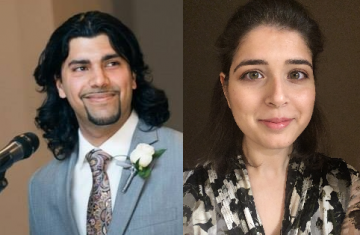Do Words Matter? (De)Constructing Constructs in Health Professions Education

Faizal A. Haji MD, PhD, FRCSC
Pediatric Neurosurgeon, BC Children’s Hospital Investigator
(Evidence to Innovation) BC Children’s Hospital Research Institute
Scholar, Center for Health Education Scholarship
Assistant Professor, Department of Surgery
University of British Columbia
Rabia Khan, MSc., PhD
Global Scholar, Dalla Lana School of Public Health
Research Fellow, The Wilson Centre
Postdoctoral Fellow, Center for Health Education Scholarship
University of Toronto
Date: Tuesday, February 13, 2024
Time: 12:00pm to 1:30pm
Hybrid: Life Sciences Centre 1312 CMR & Zoom*
Zoom Details: For connection details, please email ches.communications@ubc.ca.
Abstract
Competence. Professionalism. Burnout. Engagement. Wellness. EDI. Each of these constructs has gained prominence in health professions education research and practice. What purpose is served by constructing or deconstructing these constructs, which themselves have become God terms used in the creation of knowledge, attitudes and practice?
In this WITA, talk we hope to generate a discussion about where the interest in constructing and deconstructing constructs in HPE arises from and leads us to. In what ways is constructing and deconstructing an exercise in navel gazing versus a productive activity that generates knowledge and improves practice in the field? At what point is the construct serving us and at what point are we serving the construct?
Finally, for whom is this activity productive, and how does this inform or obscure other ways of knowing, being and doing? For instance, in psychometrics constructs are viewed through a validity lens, then generation of validity evidence is the means by which constructs are legitimatized. Conversely, in critical perspectives there is hesitancy over accepting or ascribing meaning without the historic, cultural and social perspectives within which constructs arise, thus, the deconstruction of constructs is seen as a form of knowledge generation about the construct itself.
While there may be apparent tension between these competing views, it is our goal to elucidate the common ground between these perspectives from which epistemic pluralism and interdisciplinarity may emerge.
Biography
Dr. Haji is a Pediatric Neurosurgeon at BC Children’s Hospital and an Assistant Professor in the Department of Surgery at the University of British Columbia. Having completed a PhD at the University of Toronto and Research Fellowships at The Wilson Centre and SickKids Learning Institute focused on healthcare simulation and health professions education, his research interests include the role of simulation based education and education technology for technical and non-technical skills training, as well as the role that education plays in global health and global surgery. His research program investigates (i) how the instructional design of simulation training influences learner’s cognitive load, engagement, and the transfer of knowledge and skills to the clinical setting and (ii) how to translate educational innovations in medical and surgical education to low-resource settings through global health and global surgical partnerships.
Biography
Dr. Rabia Khan is a recent PhD graduate of the Institute of Medical Sciences at the University of Toronto. Her dissertation, entitled Dying to Stay Alive in Residency and Beyond: A Critical Discourse Analysis of ‘Burnout’, examined the taken for granted relationship between ‘burnout’ and ‘suicide’ in post graduate medical education. She has completed a Fellowship at the Wilson Centre for health professions education and is a Global Scholar, having completed the Dalla Lana School of Public Health’s Collaborative Doctoral Program in Global Health.

The Division of Continuing Professional Development, University of British Columbia Faculty of Medicine (UBC CPD) is fully accredited by the Continuing Medical Education Accreditation Committee (CACME) to provide CPD credits for physicians. This one-credit-per-hour Group Learning program meets the certification criteria of the College of Family Physicians of Canada and has been certified by UBC CPD for up to 15 Mainpro+® credits. Each physician should claim only those credits accrued through participation in the activity. CFPC Session ID: 200716-001.
RCPSC ACCREDITATION: The CHES Cutting Edge Speaker Series is a self-approved group learning activity (Section 1) as defined by the Maintenance of Certification Program of the Royal College of Physicians and Surgeons of Canada.